INTRODUCTION
Wrapping Truths in Myths
British composer George Lloyd (1919–1988), who, like many composers before him, used Greek mythology as inspiration for his symphonies, made an important observation: “The ancient Greeks have a knack of wrapping truths in myths” (The George Lloyd Society, n.d., para. 7). He is playing off words that now mean the opposite of one another, truth and myth. To say something is a myth is to say that it is false, untrue, or at its very best, a fanciful lie. But you’re here to study myth-ology, and mythology is not the study of lies. Instead it is the study of truth (told in an interesting way). A truth is usually pretty straightforward—for example, “Money will not solve all your problems.” It is simple. It is cut and dried. It is the truth. But it is also boring. What if, instead of simply telling you the truth, it was illustrated through an entertaining story? What about a story that tells of a king who desired nothing more than money and used his one and only magical wish to gain the Golden Touch? The story itself is complete hogwash. A person cannot turn something into gold just by touching it. Gods do not just go around and grant random mortals’ wishes. Yet the truth is illustrated there in the story—wrapped up in layers of myth—waiting for the listeners to discover it, experience it, absorb it, and make it a part of their philosophy.
Until scientists discover that the sky does, in fact, rest on the shoulders of Atlas or that there are creatures who are half-man, half-something-else, we still classify the Greek myths as fiction. Yet you should always remember that myths were originally a way of examining humanity, and the truth of humanity is in them: human emotion, weakness, courage, and love. And these truths will never change.
Why Classical Mythology Matters
With all of the types of mythology out there—everything from Native American to Japanese—it is important to mention why classical mythology occupies its seat as the most revered. (Classical mythology encompasses the mythology of Greece and Rome, which were basically one, but we will get to that later.) The Greeks laid the groundwork for Western civilization. Their contributions in the areas of science, literature, mathematics, art, philosophy, politics, and warfare paved the way for many successive civilizations. The Greeks invented important things like democracy, history, modern medicine, drama—things you have probably heard of. Along with all of these contributions came a complex mythology, which is at times both savage and poetic. And as Western civilization progressed, the mythology of the Greeks was passed along.
Greek culture gained significant ground when Alexander the Great, a Macedonian Greek, conquered the known world and made his own culture the “in” thing. After his empire dissolved, the Romans—Greece’s neighbors to the west—picked up the slack and, adopting Greek culture as their own, continued to spread it even further. The Roman Empire ventured even further north into Europe to then-remote places like France and England. Several centuries later, when this empire had declined and ultimately fallen, the European nations—which had once been complete barbarians but were now completely “enlightened” like the Romans and Greeks before them—carried on the torch of Western civilization. (Notice how things are basically heading west, hence “Western” civilization.) The tradition went extremely west when the European nations began to cross the Atlantic and found colonies in the New World. Now the United States of America (about as far west as you can go without going back east again) is the heir to the Greek tradition.
At each stage of Western civilization’s progression, the Greek myths found a new audience and a new fanbase. The Romans were so enamored with Greek mythology that they basically absorbed it. They kept the names of their own deities (e.g., Jupiter, Juno, Mercury, Venus) but tacked them onto the Greek gods. After a series of name changes, Greek mythology became Roman mythology. When the Europeans discovered the same mythology, they did not make it the subject of their worship, but the subject of their art. Literature, music, and art contain innumerable references to classical mythology. Only the Bible is alluded to more often.
DISCUSS
- Can you think of any other references to classical mythology in the modern world?
RESEARCH
Locate a product that uses a reference to classical mythology in either its name or its advertising. Discuss how the reference helps sell the product.
You may not spend your spare time looking at paintings or listening to classical music, so how has classical mythology technically impacted your world? Phrases like “Achilles heel,” “Oedipus complex,” and “Between Scylla and Charybdis” proliferate the English language. The planets in our solar system bear the Latinized (Roman) names of the gods, and the months of the year contain references to them as well (e.g., January, March, April, May, June). Everything from young adult novels (the Percy Jackson series), to tennis shoes (Nike), to video games (God of War), to the modern Olympics uses classical mythology as a reference point. So maybe it is time you started paying attention. No other set of myths has ever—or will ever again—impact your culture so greatly.
The Many Meanings of Myths
For the original myth-makers, myths served a variety of purposes. For starters, myths helped ancient people answer their questions about the complex world around them: Why does the sun travel the same course over the sky day after day? Why do the seasons change? For this reason, myths were a primitive stab at science. In addition to Mother Nature, myths also helped explain human nature—why do humans act the way they do?—and the mystery of human existence or why men exist in the first place. Myths also served as warnings and determined the boundaries of society by illustrating which behaviors were unacceptable and resulted in punishment from the gods. Many fantastic things happen in myths—men fly, statues come to life, and men achieve the power to live forever. All of these reflect the conscious (or unconscious) desires of the myth-makers. Lastly (an often overlooked function of myth in all of the hubbub of hidden meaning), myths were made to entertain, and to this end they still succeed.
Mythologist is a term for someone who studies mythology, and this will be your title as you read the myths presented in this book. As you read, look for the various functions of mythology. Be prepared to discuss and analyze these at different intervals. These myths have been interpreted anew by each successive generation. Your interpretation will be no less valuable.
The Gallery of the Gods

Zeus (Roman Names: Jupiter, Jove)
Lord of the Sky, Rain-Bringer, Cloud-Gatherer
After leading his brother and sister gods in a revolt against their forefathers, the Titans, Zeus became the unquestioned ruler of the heavens. His feared weapon is the thunderbolt, and his palace on Mt. Olympus is a place of peace, where all gods are welcome. Zeus is the husband of the goddess Hera, but it’s not in his nature to be faithful. Time and time again, he enters into disastrous affairs with other goddesses, nymphs, and mortal women. Zeus is the all-father. Almost all of the second generation of gods claim Zeus as their father. Many of the mortal heroes are children of the god as well. Zeus’ bird is the eagle.

Apollo (Roman Name: Phoebus Apollo)
God of Light, Truth, Poetry, Health, Prophecy, and Music
From all of the important titles laid at Apollo’s feet, you can see the Greeks thought very highly of him. He is called the “most Greek" of all of the gods. He, above all others, represented the ideal man—handsome, athletic, intelligent, talented, and good. His twin sister is Artemis, Goddess of the Moon. Over time, Apollo came to replace the Greek god Helios as God of the Sun as well. The lyre is Apollo’s instrument, as he is the master musician. Apollo’s tree is the laurel. A wreath of laurels was awarded in Greece to those who won a contest of poetry. Apollo’s oracle in Delphi was the most reliable and the most popular.

Aphrodite (Roman Name: Venus)
Goddess of Love and Beauty
Aphrodite was so lovely that the Greeks couldn’t imagine her being born in the usual way. Instead she sprang from the white beauty of the sea foam. In an odd arrangement, this most beautiful goddess was married to the only ugly Olympian, Hephaestus, the deformed forge god. Some said that Zeus forced her into the marriage; others, that she chose him herself. Either way, her vows did not stop her from having many affairs. Gods and mortal men found her charms simply irresistible. Whenever on business abroad, Aphrodite is pulled through the sky by a swan-drawn cart. The swan and the dove are both symbols of her grace. In Greece her worship was popular, although the temple priestesses were rumored to be prostitutes. Our word aphrodisiac, a passion-inducing substance, is derived from her name.
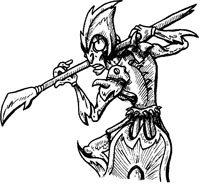
Ares (Roman Name: Mars)
God of War
Ares is the cruelest member of the Olympians, hated by all. This god is known for his ruthlessness when he has the upper hand and his cowardice when the tides turn against him. Even the Greeks disliked this terrible god. There were no temples to Ares in ancient Greece. Aphrodite, in one of her many infidelities, started an affair with Ares, which was his motivation to fight for the Trojans in the war. Martial (having to do with war) and March are coined from his Latin name.
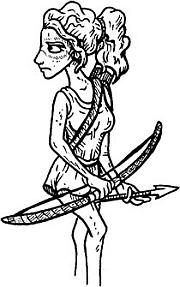
Artemis (Roman Name: Diana)
Virgin Goddess of the Hunt, Protector of Maidens and Wild Creatures
Artemis is often called upon by maidens who want nothing to do with men. Her silver arrows have slain many overzealous suitors. Artemis is also the twin sister of Apollo and revered as the Goddess of the Moon. At times her different duties contradict one other. Even though she is a hunter of animals herself, she often demands that mortals pay for killing defenseless beasts. In the most famous case, she demands that a Greek army offer her a human sacrifice in apology for trampling a family of rabbits. She asks for the life of the general’s young daughter, a maiden. This is strange behavior for the protector of maidens.
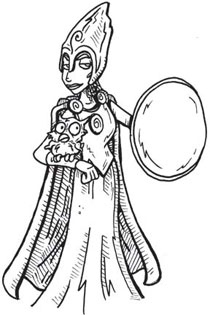
Athena (Roman Names: Minerva, Pallas Athena
Goddess of Wisdom and Battle
According to one tale, Athena was not actually born, but sprang fully grown from Zeus’ head. This is symbolic of her distinction as Goddess of Wisdom. Athena’s animal is the wisest of birds, the owl. As the leader of the Virgin Goddesses, those who will never marry, Athena refuses to let any man be her master. When a new city-state was founded, there was a contest between Athena and her uncle Poseidon over who should be its patron god. The competition was fierce. To win the people over to his side, Poseidon formed the first horse from the crest of a wave. In order to one-up his gift, Athena created the bridle, a tool man could use to subdue Poseidon’s creation. Because her gift was the wiser, the city chose Athena as their patron goddess. From this point on the city-state was called Athens.
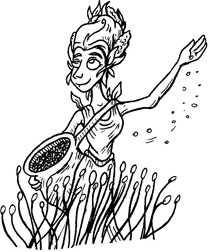
Demeter (Roman Name: Ceres)
Goddess of Agriculture
The Greeks and Romans felt an extremely strong connection with Demeter. The goddess was responsible for providing them with their sustenance and livelihood. In addition to this, Demeter was one of the few gods who did not reside on Olympus. She lived on Earth, where she could be close to those who needed her most. Also unlike the other gods, Demeter’s existence was bittersweet. In the fall and winter, she mourned her daughter, Persephone (Proserpine), who was taken into the Underworld to be the wife of Hades. Only during the spring and summer, when her daughter returned to visit, was Demeter truly happy. All of these qualities endeared her to her worshippers. Her sacred cult at Eleusis was one of the most popular, and the secrets were kept so well that to this day researchers have no clue what their rites consisted of. From Ceres comes our word for grain-based food, cereal.
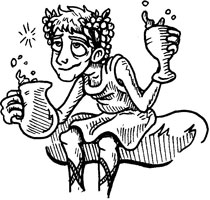
Dionysus (Roman Name: Bacchus)
God of the Vine and Wine, Patron God of the Theatre
Dionysus was a latecomer to Mt. Olympus. He is the only god to have a mortal parent. Dionysus is a two-sided god. On one side, he is the gentle planter of the vine. On the other, he is a wild drinker, inspiring his followers to commit terrible acts through their intoxication. Satyrs—half-men, half-goat creatures—were said to be the companions of Dionysus, along with his fanatical female followers (the maenads). Followers of Dionysus gathered in the wilderness and drank themselves into a wild frenzy. More often than not their gatherings ended with violence. In many stories, kings, who do not approve of the new god or the behavior he promotes, forbid his worship. This probably reflects Greek society’s displeasure with the worshippers of Dionysus, whom many viewed as hedonistic drunks. Despite his late addition to the gods and his initial opposition from men, Dionysus became one of the most popular additions to the Greek pantheon. Athens dedicated its springtime drama festival to the god, solidifying his place as patron god of the theatre.
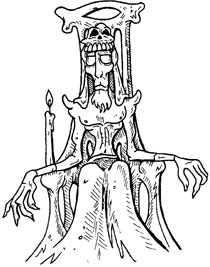
Hades (Roman Names: Pluto, Dis)
Ruler of the Dead, Lord of the Underworld
Although he has been presented as one before, Hades is no villain. He is cold and calculating. He keeps to himself, only showing up in myth when he is sought out. Hades is more a recluse than anything else. He has little to do with mortals’ lives. Their deaths are a different story. Hades is not Death himself; in other words, he is not responsible for deciding when mortals die. A mortal’s death is an assembly line: The Fates snip the threads of life, Thanatos (or death) causes the mortal to die, and Hermes leads the soul to the banks of the Styx. After the gods defeated their forbearers, the Titans, Hades was presented with a helmet of invisibility and given the Underworld to rule. Hades’ Roman name, Pluto, came from the Greek word for wealth. The god was considered rich because of all of the precious metals that are found beneath the Earth.
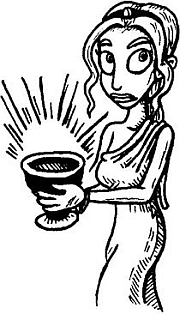
Hebe
Goddess of Youth
Hebe is the most easily overlooked Greek goddess. Her only job on Olympus is to hold the holy cup from which the gods drink. Nectar, the magical liquid found within the cup, confers immortality on those mortals who drink it. Ambrosia, a food fine enough for divine lips, also is eaten on Olympus. Hebe is the daughter of Zeus and Hera. When Heracles (Hercules) completed his life of heroic deeds, he ascended to Olympus, where Zeus allowed him to drink from the holy cup. The hero then became a god, and Zeus presented him with a new wife, Hebe.
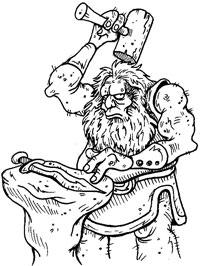
Hephaestus (Roman Name: Vulcan)
Smith-God of the Forge, God of Fire
Hephaestus, a peace-loving god, is the patron of practical arts. He is renowned for his metalworking abilities. The unparalleled armor of the gods and heroes come from his forge. His lame leg and grizzled appearance earn him the distinction of being the only ugly god. In fact, when Hera gave birth to such an unattractive son, she hurled him out of heaven, laming his leg. Ironically, Aphrodite, goddess of beauty, is his wife. The Romans pictured the fiery god Vulcan working his forge beneath the mountains, and when they saw a hilltop erupt with flame, they labeled it a volcano.
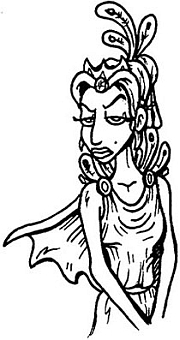
Hera (Roman Name: Juno)
Goddess of Marriage, Queen of Olympus
Hera usually is shown as a crafty schemer and jealous wife. She is the mother of a few of the second-generation gods: Ares, Hephaestus, and Hebe. Zeus and his frequent affairs are enough to keep her busy punishing his many lovers and cursing his illegitimate children. Hera is labeled as the protector of marriage, even though she cannot protect her own. Wives with unfaithful husbands could definitely sympathize with her. Hera has a fiery temper and enough venomous anger to last centuries. Her beast is the cow, and her bird is the peacock. The Romans named June, the season for marriage, after Juno.

Hermes (Roman Name: Mercury)
Messenger of the Gods
Hermes, the most mischievous and clever of the gods, also serves as a psychopomp (a guide of dead souls to the Underworld). One of the youngest gods, Hermes showed his ability to cause both trouble and delight at an early age. On the day of his birth, Hermes snuck out from his cradle and whisked away the cattle of his elder brother Apollo. Hermes was quickly found out and forced to return the cattle. But, in reparation for his actions against Apollo, the newborn god created a lyre from the shell of a turtle. He presented the stringed instrument to his older brother. Apollo’s anger melted away, and he gifted Hermes with a magical sleep-inducing staff called the caduceus. Once Zeus realized his young son would cause nothing but trouble if he weren’t constantly occupied, Hermes was given the job of Olympian Messenger. A winged cap and sandals were presented to him to assist him in his duties. Due to the nature of his job, Hermes appears most often of all of the gods.
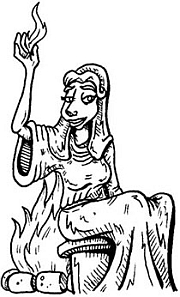
Hestia (Roman Name: Vesta)
Goddess of the Hearth and the Home
Hestia never plays a part in any Greek myth. Even though she wasn’t exciting enough to make it into their stories, the Greeks honored Hestia with their dinnertime prayers, asking her to bless their food and protect their homes. City-states had a central hearth dedicated to the goddess, where a holy fire forever burned. She is the third of the three virgin goddesses. In Rome she was the patron goddess of the Vestal Virgins, who kept the hearth fire of Rome forever burning.
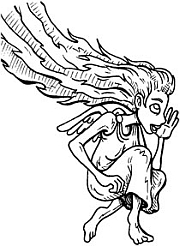
Iris
Goddess of the Rainbow, Messenger of the Gods
Second only to the godly messenger Hermes, Iris delivers the divine decrees of Olympus. The Greeks saw the rainbow beginning at a distant point and touching down at the opposite end of the horizon. To their ancient minds, this multicolored trail could only be one thing: The path left by a goddess as she made her way through the heavens. In the modern world, the colorful part of the eye is named for this goddess. The plant iris also is named after her for its variety of colorful flowers.
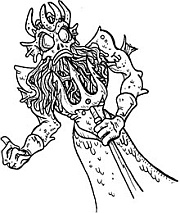
Poseidon (Roman Name: Neptune)
The Blue-Haired God of the Sea
Next to Zeus, Poseidon is the god the Greeks most feared. As a sea-faring people, they knew the hazards of a stormy sea. The god was known for his mood swings—violent rage one minute, calm the next—just like the waters he controlled. In the Trojan War he favored the Greeks because of their love of shipbuilding, yet legend had it that generations before, he and Apollo had helped build the walls of Ilium.
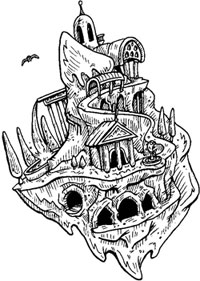
Mt. Olympus
The Heavenly Mountain of the Gods
The palace of Zeus on Mt. Olympus is the home of the 12 Olympian gods and goddesses. When the heavens and Earth were divided between his two brothers, Poseidon and Hades, Zeus declared that Mt. Olympus would be common to all. Here is where the gods have their great debates, sipping nectar and eating ambrosia. In the earliest myths, Mt. Olympus is still associated with the mountain in Greece that bears the same name. But, by later times, it was imagined to be a mystical place, floating high in the heavens.
















